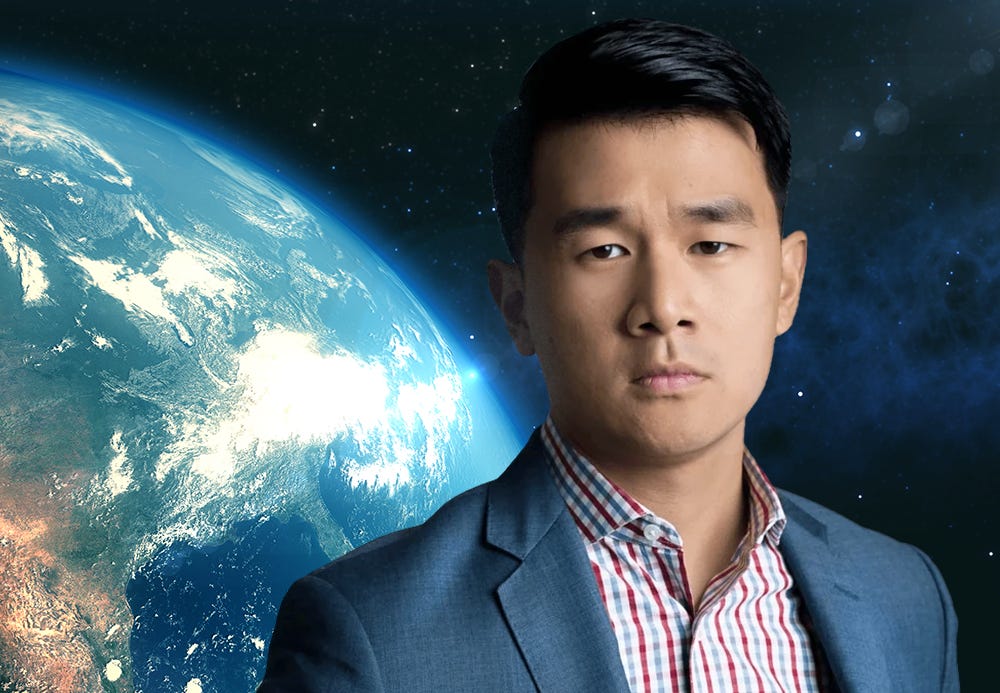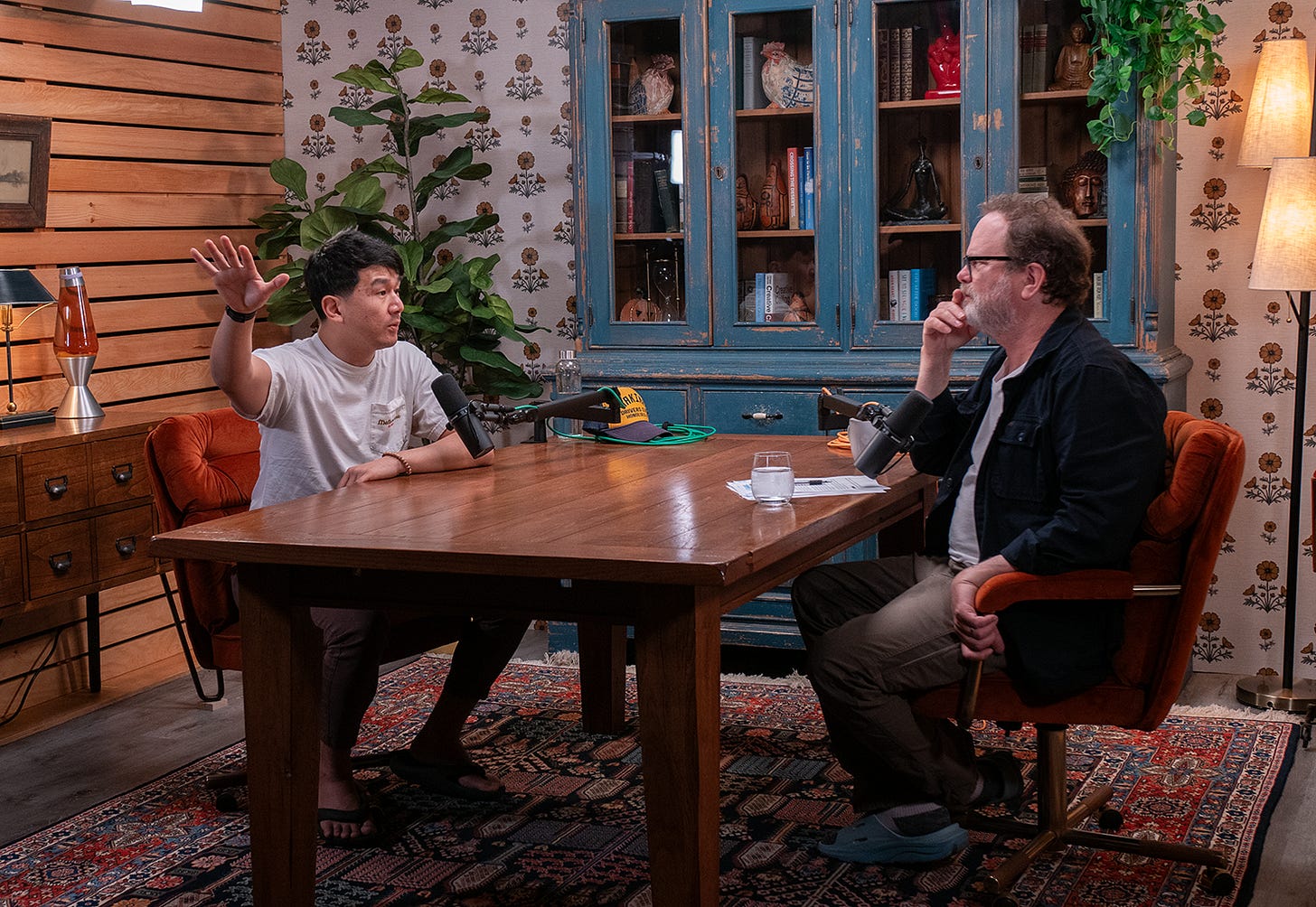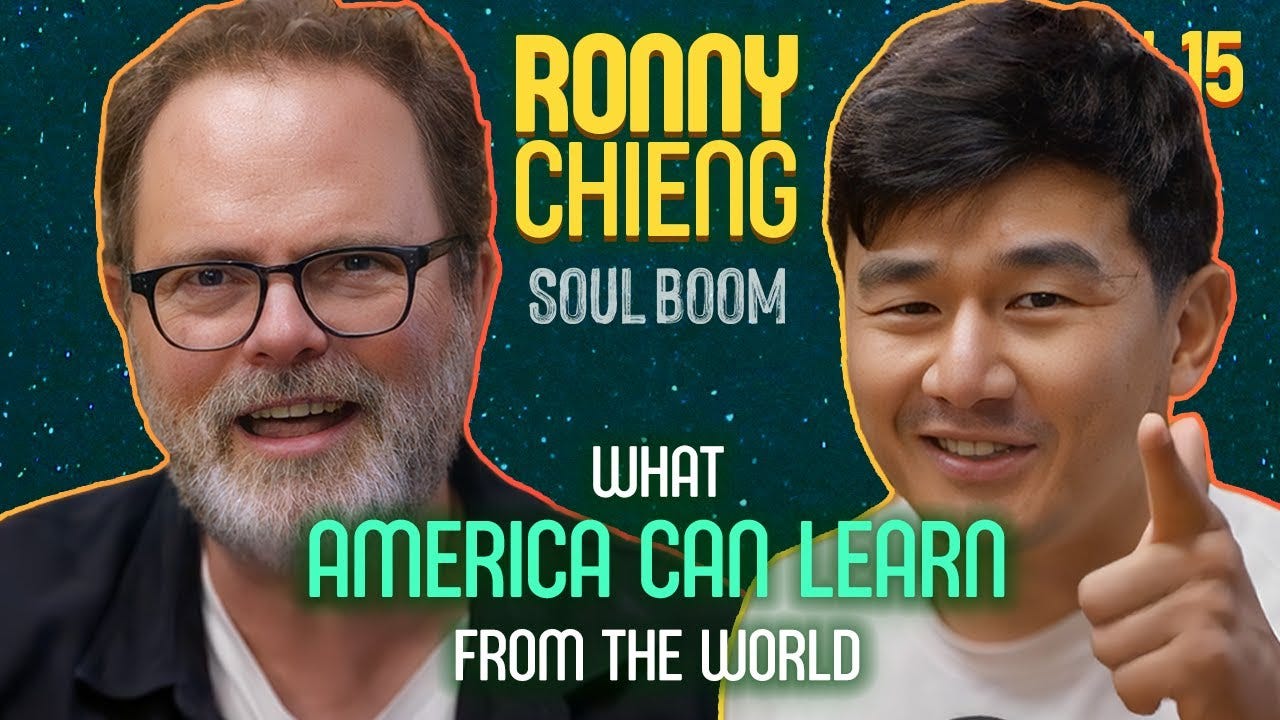Ronny Chieng, World Citizen?
Plus, Spiritual Life Hacks From Around the World
This week on the podcast, we have the very funny Ronny Chieng. If you haven’t experienced his brand of sharp, insightful comedy yet, you’re in for a treat. Ronny isn’t just a comedian; he’s a true world citizen who uses humor to dissect and illuminate the complexities of race, identity, and cultural stereotypes. His presence on the international stage is itself a testament to how our planet has shrunk into a global neighborhood. Ethnically Chinese and born in Malaysia, he went to elementary school in Singapore, and later pursued his education in Australia. His life is like a whirlwind tour of world cultures.
He made his mark at the Melbourne International Comedy Festival, where his unique perspective and razor-sharp wit caught everyone’s attention. From there, he landed a spot on "The Daily Show" where for years now he has continued to break down cultural stereotypes with the precision of a Swiss watchmaker.
In our interconnected world, comedians like Ronny Chieng (or his former colleague, Trevor Noah) are more than just entertainers—they are essential voices guiding us through the complexities of modern life.
Unfortunately for a lot of us, our encounters with other cultures aren’t in joyful, relaxed settings like at the farmer’s market or at a community potluck. No, sadly, all too often we encounter the “other” in the context of wars and forced migration and pandemics and economic crises and dislocation of all kinds. And as a response, we have seen a resurgence of the most crude expressions of racism, nationalism and factionalism. As has so often happened, people fall into scapegoating to make sense of all the problems they face.
As Yuval Harari has rightly pointed out in the case of the heartbreaking violence and bloodshed we see, the conflicts are not in fact about resources but about conflicting stories:
“Humans don’t fight over territory and food. They fight over imaginary stories in their minds. If I look at the present terrible conflict tearing apart my region of the world, it’s not really about territory, not objectively. There is enough land between the Mediterranean and the Jordan River to build houses and schools and hospitals for everybody. And this is true of other conflicts in the world. You look at the Russian invasion of Ukraine. Russia doesn’t lack territory. The last thing they need is more land, and so why do they fight? People fight over the stories in their mind.”
While this may have been the way things have worked among humans for millennia, it is no longer tenable in our interconnected age. Encounters with different peoples, each holding narratives in which they themselves—and only themselves—are centered, naturally lead to highly combustible interactions. Like when fire meets gasoline. And that is actually a poor analogy since things could literally go nuclear.
The only solution is a story that’s big enough for all of us—just like this one precious Earth we all inhabit.
I think of God addressing humanity in the Qur'an: “O mankind, we have created you from a male and female, and made you into nations and tribes, that you may know one another.” But if we are to know each other—if we are to interweave our many and varying stories into one grand narrative—we first need to listen to each other. And have empathy for each other. Cry together. Learn together. Laugh together! Perhaps most especially laugh together.
That’s why I wanted Ronny on the podcast. His comedic lens helps us see our own cultural quirks and contradictions with a fresh perspective, making us laugh while gently nudging us towards greater self-awareness. It isn’t just about pointing out the absurdities of life; it’s about bridging gaps and fostering understanding. He invites us to see the world through his eyes, to walk a mile in his shoes. In doing so, he helps us understand a little more about ourselves and the world around us. His work reminds us that we are all part of one human family, sharing this tiny blue dot in the vast expanse of the universe.
For me, this journey, both for us as individuals and as a collective, is fundamentally spiritual. I’m not sure Ronny sees it that way though. Like a lot of people, Ronny isn’t too keen to wear his heart on his sleeve and is a bit uncomfortable with explicit discussions of spirituality. “As a man of science, I try to suppress spirituality,” he said—a statement that immediately drew my attention. He specifically made that comment in the context of acknowledging some very “weird positive coincidences.” Those “weird” experiences were happenings that defied his understanding, including some dreams (which I don’t want to spoil for you if you haven’t listened to the episode yet) that very much seemed to be messages from the realm beyond.
Reflecting on what Ronny shared about those strange, inexplicable experiences, I can’t help but think of Bahá’u’lláh’s statement that God has placed these signs in our lives so we can’t deny in our hearts the reality of the Divine. As we encounter these signs in ourselves and in the world, it becomes clear to us there is a Great Mystery to which we are all connected. When I pressed Ronny further on this point, offering the thought that we don’t have to fight, we can simply share and explore with each other, his response was that he would rather just find common ground in the things we can all agree on—by which I presume he meant the material world, the here and now. I completely understand where Ronny is coming from in his fear that people will fight over these imaginary stories. It is a complete waste of time, which is why ‘Abdu’l-Bahá said that if two people are arguing over religion, then they’re both wrong.
But instead of seeing it as an occasion for argument, what if we looked at religion in the same way we think of food? People are a lot more brave about trying out foreign cuisines than they used to be. They could use that same courage to explore the religious traditions of others and learn from one another. They might find some morsels of wisdom even more delicious than their favorite “ethnic” dish!
Thinking about this made me reflect on a talk I offered for a TEDx event in Goiânia, Goiás, Brazil. I gave it during the pandemic on spiritual life hacks found around the world. At the time I was working through the ideas that would become Soul Boom the book. So it’s only fitting to share them here now on the Soul Boom Dispatch.
Scroll down for a video of the talk accompanied by the transcript.
Hopefully, you find the spiritual life hacks listed below useful or at least interesting. If you have some other hacks you’ve discovered along the way, please do share them in the comments below!
Rainn Wilson
Greetings Goiânia, Brazil!
I wish I could be there in person at your TEDx conference, but, alas, it was not to be. Well, my presentation today has nothing to do with technology, entertainment, and design, unless we're talking about the T.E.D., the Technology, Entertainment, and Design of the Human Heart.
Because besides being a comedic actor, one of my biggest personal passions is the study of spirituality and of comparative religions. And for me, spirituality has no use unless it specifically makes my life better, unless it has some kind of practical application. On the internet, these practical applications that “make one's life better” are called hacks, life hacks.
There are memes about them and whatnot. For instance, you can use a post-it note to clean the dust from your computer keyboard. How about that? But what if there were life hacks to make your life better from a spiritual perspective? Practical applications, such as, you know, one thing that springs to mind, the infamous Golden Rule:
“Do unto others as you would have them do unto you.”
The most ancient and universal of spiritual teachings that existed for thousands of years before the Torah and the Bible even. In fact, it's in every single religious tradition around the globe. And it exists in most indigenous faiths as well. Black Elk, the spiritual leader of the Oglala Sioux, taught that all things are our relatives. What we do to everything, we do to ourselves. All is really one.
Okay, so let's look at some of these spiritual life hacks from around the globe. Life hacks that can potentially make not only our lives better, but other people's lives better as well. And hopefully these practices radiate outward to make our chaotic world a somewhat better place.
And it should be said that, apologies in advance if I get some meaning wrong, or I miss some nuance, or mispronounce something. I'm not an expert in this field. And also an apology for only touching superficially on some of these teachings that one could really study for a lifetime, but I'm trying to cram into 10 minutes.
So many of these life hacks also are interlinked across many belief systems. You'll see how they flow into one another across the centuries, across holy books, and various world religions. For instance, the traditional Hindu greeting, accompanied with a bow in Sanskrit, of “Namaste,” means, literally: I bow to you.
But its deeper metaphorical meaning is: the divine in me bows to the divine in you. To many Hindus, if you dig even deeper, the meaning of the phrase in the greeting equates with: I honor the place where, in you, the entire universe dwells. My soul recognizes your soul. And finally, we are one.
Now, could you imagine this greeting taking place in contemporary America, or contemporary Brazil, where the standard greeting is: Hey, what's up? How's it going, man? How's it going? Not to mention that the bow is far more hygienic during a pandemic than a handshake.
So how is this a life hack? Well, because when I greet someone, I can sometimes internally choose to witness their divineness as I greet them; to honor them, respect them, see them, with humility and reverence.
My day is infinitely better when I remember to do this, literally or figuratively. And it helps me remember how precious and light-filled every single human being is. This same tradition mirrors itself in the Sikh tradition of greeting with the phrase, “Sat Siddhi Akal,” or literally, God is truth.
Again, a phrase filled with a myriad of resonances. And this concept of seeing the divine in everyone is also reflected in the Jewish belief system of B'Tselem Elohim: We are created in the image of God. And if that is so, well then it behooves us to relate to one another in that same Hindu spirit of namaste.
Now could this be a spiritual life hack? What are the practical, tangible applications of B'Tselem Elohim? Well, let's say I'm having a hard day, I'm feeling down on myself, self-critical, judgmental, as often a lot of us are, low self-esteem, perhaps some mental health issues like anxiety and depression. But by practicing the perspective of B'Tselem Elohim, I can turn inward and know that I, as well as everyone else in the world, is created in the image of God. Not physically, necessarily - I don't think God is balding and has a double chin - but this perspective can elevate our consciousness.
Meditating on this concept shifts my perspective. I am divine. I have the potential to radiate qualities that define the divine. And if God is the creator, if God is all-merciful, all-loving, well then my actions are a reflection of God, and I can mirror forth creativity, mercy, and love, not least of all toward myself. So this focuses my actual behavior ever so slightly towards generosity, both towards myself and to the world and its peoples.
This relates to another profound spiritual practice. In Islam there is a saying, or hadith, often ascribed to the Prophet Muhammad: “Whoever knows himself knows his Lord.”
This is a revolutionary concept. I mean we've looked into the teachings that have pointed to the Divine Being being within all of us, and this offers a slightly different perspective. It's practical too. We can literally know more about the divine by learning about ourselves.
And personally, this creates in me a hunger to know more about how I operate, what makes me tick, why I make the choices that I make, good and bad, what my patterns of behavior are, how my heart works, my brain too, and most of all my soul, that mirror of the divine.
Because in this process of intensely learning about myself, sometimes in therapy, sometimes journaling, sometimes in simple observation, there lies an excavation of what is holy and mysterious about the universe. And there's a beautiful conundrum contained in this teaching, because so many religious faiths, what we call God, the creative force behind this universe and infinite other universes, is essentially unknowable.
So as we seek to know ourselves, we are gaining a deeper and clearer understanding of what is essentially unknowable. We are knowing the unknowable. I mean, how cool is that? Now if it seems like this teaching can drift a little bit towards the metaphysical, I'd like to bring us back to the practical for a second.
In my own Bahá'í faith, there is a related teaching from the son of the founder, 'Abdu'l-Bahá. This is guidance that could not be more grounded, or in my humble opinion, more just kind of meat and potatoes. 'Abdu'l-Bahá says, “If a man has ten good qualities and one bad one, look at the ten and forget the one; and if a man has ten bad qualities and one good one, look at the one and forget the ten.”
I just love this quote. It has so many applications. One of the hardest things that any of us will ever encounter is dealing with the faults and flaws of others. In fact, you know what? I was on a TV show that dealt with this every single week. So sometimes I'll be working with someone who is filled with what I would judge as negative qualities, and I'm at a complete and total loss. I'm not able to “namaste” this person or see them in any kind of image of God.
Well, all I need to do then is find one practical positive thing to focus on, and I hope you're doing that with me right now. For example, they might be selfish and mean and constantly interrupting, but I focus on the fact that they have good hygiene. That gives me something to hang on to. Wow, this person is annoying and horrible in so many ways, but boy, are they clean. That's fantastic. Let me just stick with that. And here's the good news: if we stay focused on the good, more and more, we start to just see the good in others as we move through our day.
Now, there are countless other spiritual life hacks to be utilized for a better, more balanced, more contented life, but I don't have time to get into them here and now, I'm afraid. And I feel terrible that somehow I've neglected Buddhism entirely in this presentation. It's a spiritual tradition that contains literally dozens or maybe even hundreds of spiritual life hacks, but I wanted to share a very small taste of some of the practical tools for a better life that can be found in the world's spiritual and religious practices.
There are countless others to unearth, and I wish you all the very best in your journey.
In summation, I'll just leave you with this: Namaste.







